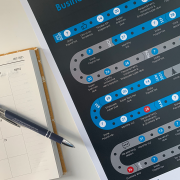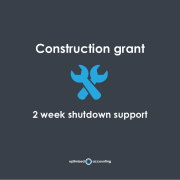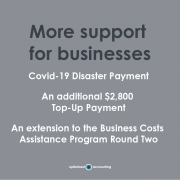EOFY is once again around the corner, and we encourage business owners to be proactive. Talk to your accountant, look at your books, and make any little adjustments needed before June 30 hits. This will have optimal results for next financial year. So let’s get planning!

Over at Optimised Accounting, May is tax planning time. So that means we are in the thick of it at the moment! To explain, if you were one of our business clients, we would invite you in for a video call/face to face meeting to discuss how you are tracking financially, what to expect when we prepare your annual tax return, and if there’s anything we suggest you should do before EOFY. We are able to have these meetings because we are (almost) always up to date with clients tax obligations and have a clear picture of how you look.
If you don’t have a Business Accountant like us taking care of you, here’s a list of things to consider and/or seek advice on:
Are you up to date with your tax obligations?
Now is a good time to check that your quarterly BAS, your PAYG, and whatever else you are required to report (and pay) to the ATO is up to date.
Do you need finance?
One of the major things that clients bring up at tax planning sessions, is that they are looking at buying a new rental property or new car, and will need finance soon.
It’s important in these cases especially to be up to date and to let your Accountant know asap.
Bring forward expenses
If you are in a position to do so, bring forward any expenses. This means if there is a work expense that you know is pressing but you have put it off, go ahead and organise it now. You will then be able to claim the deduction in this financial year rather than wait until next year.
If you have any invoices that are due before June 30, pay them so they are included in your records.
Write off bad debts
Review your outstanding invoices prior to 30th June to identify any bad ones. If you have chased them up already a few times and it looks unlikely they will be paid, simply write it off.
Do a stocktake
If you are a product based business, identify and dispose of any obsolete, slow-moving or damaged stock so you can claim a tax deduction for the write-off.
Employee super contributions
Your employees superannuation is due at 4 times throughout the year (July, October, January and April).
It is very important that these are each paid on time, as the ATO are really starting to crack down on late payments. Even one day late can result in a fee.
(It is also unfair to your staff to have unpaid super, but we don’t need to tell you that).
If you have any outstanding super payments, it’s time to process these.
In order to get the deduction, payments must reach super accounts before 30th June 2022, which means you will need to transfer by 14th June to allow time for processing.
Superannuation funds must receive the funds before 30th June, so it’s important that you pay with ample time before hand.
Want to boost your own super?
If you’re considering adding some extra superannuation into your account, now is the time to do so.
To get the deduction, your super needs to hit the account before 30th June, so you will need to transfer by 14th June to allow time for processing.
Have you registered for a Director ID yet?
While I have you and you are being proactive about your business – All directors of businesses need to apply for a Director ID. We know you’re busy, but have you done this yet?
If you’d like some help setting up your Director ID, please read instructions about this here.
Reconcile Xero
Ensure your Xero is reconciled, this should be obvious 🙂
Run your business as a company?
Do you operate your business out of a company structure? If so, remember that there is a line between your personal finances and those of your company.
If you have taken funds out of the company that haven’t been declared as a dividend or wage, those funds may be sitting on the company accounts as a loan to you from your company. Ensuring this is considered and handled appropriately means you’ll avoid being taxed twice on the same income!
Consider your personal tax
Now is also a great time to review your personal tax preparations for 30 June.
Look at personal tax decisions such as additional superannuation contributions, getting a depreciation schedule drafted for your property and making sure you can substantiate any work related or investment expenses that you may have.
Time for a restructure?
Here at Optimised, we love a restructure. This is because we want to ensure all business owners are structured in the best way for them. Having the correct business structure can ensure you are protected in the future should anything happen.
We recently held a business structuring webinar, and the recording is still available. You can watch it here. Please let us know if you’d like a meeting to discuss.
Cryptocurrency
Cryptocurrency was very hot this year, and a lot of people bought some. Some made money, some lost.
In short, if you’ve dealt with crypto at all this financial year you need records of everything.
The ATO has a special taskforce dealing specifically with cryptocurrency this financial year.
It is considered an asset for tax purposes, rather than a form of currency.
This means that gains or losses made on disposal or exchange of cryptocurrency will often be captured under the tax system – regardless of whether you’re switching between currencies or ‘cashing out’ your asset into AUD.
You will need to keep records of all of your trades in order to work out whether you’ve made a taxable gain or loss.
Talk to your Accountant
If you are still struggling to stay on top of your tax obligations due to the pandemic, make sure you tell your Accountant (or the ATO if you don’t have a Business Accountant) to discuss deferring your tax payments or perhaps whether you are eligible to vary your quarterly PAYG instalments.
If your Accountant has offered a Tax Planning session, this could be quite beneficial so it’s worth doing this if available.
Want help?
If you feel like you could use some support with your business, we’d love to hear from you.
Read here how we work with business owners just like you, and get in touch today.
The featured image above is copyright Xero.
Learn more tips for optimising your business
There are many tricks to the trade, and if you want to make the most of them to grow your business, jump into our email newsletter:











